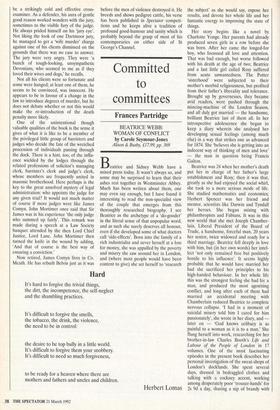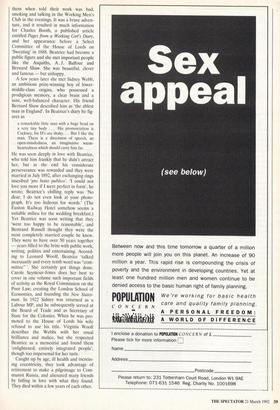Committed to committees
Frances Partridge
BEATRICE WEBB: WOMAN OF CONFLICT by Carole Seymour-Jones Alison & Busby, ,E17.99, pp. 369 Beatrice and Sidney Webb have a mixed press today. It wasn't always so, and some may be surprised to learn that their ashes rest together in Westminster Abbey. Much has been written about them, one may even say enough, but I have found it interesting to read the non-specialist view of the couple that emerges from this thoroughly researched biography. I see Beatrice as the archetype of a 'do-gooder' in the literal sense of that unpopular word, and as such she surely deserves all honour, even if she developed some of what doctors call `side-effects'. Born into the family of a rich industrialist and never herself at a loss for money, she was appalled by the poverty and misery she saw around her in London, and (where most people would have been content to give) she set herself to 'research
the subject' as she would say, expose her results, and devote her whole life and her fantastic energy to improving the state of things.
Her story begins like a novel by Charlotte Yonge. Her parents had already produced seven girls in a row before she was born. After her came the longed-for boy, who focussed all love and attention. That was bad enough, but worse followed with his death at the age of two; Beatrice and a last little girl called Rosy suffered from acute unwantedness. The Potter `sisterhood' were subjected to their mother's morbid religiousness, but profited from their father's liberality and tolerance. Brought up by governesses, they became avid readers, were pushed through the mincing-machine of the London Season, and all duly got married — the handsome, brilliant Beatrice last of them all. In her introspective adolescence she began to keep a diary wherein she analysed her developing sexual feelings (among much else) in a way that strikes one as advanced for 1874. She 'believes she is getting into an indecent way of thinking of men and love' — the man in question being Francis Galton.
Beatrice was 24 when her mother's death put her in charge of her father's large establishment and Rosy; then it was that, greatly as she had enjoyed the social whirl, she took to a more serious mode of life. She studied mathematics and economics; Herbert Spencer was her friend and mentor, scientists like Darwin and Tyndall her heroes. She began mixing with philanthropists and Fabians. It was in this new world that she met Joseph Chamber- lain, Liberal President of the Board of Trade, a handsome, forceful man, 20 years her senior, twice widowed and ready for a third marriage. Beatrice fell deeply in love with him, but (in her own words) her intel- lect 'not only remained free but positively hostile to his influence'. It seems highly probable that he would have married her had she sacrificed her principles to his high-handed behaviour. In her whole life this was the strongest feeling she had foi a man, and produced the most agonising conflict, and long after each of them had married an accidental meeting with Chamberlain reduced Beatrice to complete nervous collapse. 'I had in a moment of suicidal misery told him I cared for him passionately', she wrote in her diary, and later on — 'God knows celibacy is as painful to a woman as it is to a man.' She flung herself into work, researching for her brother-in-law Charles Booth's Life and Labour of the People of London in 17 volumes. One of the most fascinating episodes in the present book describes her personal investigation of the sweat-shops of London's docklands. She spent several days, dressed in bedraggled clothes and talking with a cockney accent, working among desperately poor `trouser-hands' for 2s 9d a day, sharing a nip of brandy with
them when told their work was bad, smoking and talking in the Working Men's Club in the evenings. It was a brave adven- ture, and it resulted in much information for Charles Booth, a published article entitled Pages from a Working Girl's Diary, and her appearance before a Select Committee of the House of Lords on `Sweating' in 1888. Beatrice had become a public figure and she met important people like the Asquiths, A . J. Balfour and Bernard Shaw. She was beautiful, clever and famous — but unhappy.
A few years later she met Sidney Webb, an ambitious prize-winning boy of lower- middle-class origins, who possessed a prodigious memory, a clear brain and a sane, well-balanced character. His friend Bernard Shaw described him as 'the ablest man in England'. In Beatrice's diary he fig- ures as
a remarkable little man with a huge head on a very tiny body .. . His pronunciation is Cockney, his H's are shaky... But I like the man. There is a directness of speech, an open-mindedness, an imaginative warm- heartedness which should carry him far.
He was soon deeply in love with Beatrice, who told him frankly that he didn't attract her, but in the end his considerate perseverance was rewarded and they were married in July 1892, after exchanging rings inscribed 'pro bono publico'. 'I could not love you more if I were perfect in form', he wrote; Beatrice's chilling reply was 'No dear; I do not even look at your photo- graph. It's too hideous for words.' (The Euston Railway Hotel somehow seems a suitable milieu for the wedding breakfast.) Yet Beatrice was soon writing that they `were too happy to be reasonable', and Bertrand Russell thought they were the most completely married couple he knew. They were to have over 50 years together — years filled to the brim with public work, writing, politics and entertaining. Accord- ing to Leonard Woolf, Beatrice `talked incessantly and every tenth word was "com- mittee" '. She certainly got things done. Carole Seymour-Jones does her best to cover in one volume such important fields of activity as the Royal Commission on the Poor Law; creating the London School of Economics, and founding the New States- man. In 1922 Sidney was returned as a Labour MP, and he subsequently served at the Board of Trade and as Secretary of State for the Colonies. When he was pro- moted to the House of Lords his wife refused to use his title. Virginia Woolf describes the Webbs with her usual brilliance and malice, but she respected Beatrice as a memoirist and found them 'enlightened, entirely integrated people', though too impersonal for her taste.
Caught up by age, ill health and increas- ing eccentricity, they took advantage of retirement to make a pilgrimage to Com- munist Russia, and alienated many friends by falling in love with what they found. They died within a few years of each other.



























































 Previous page
Previous page